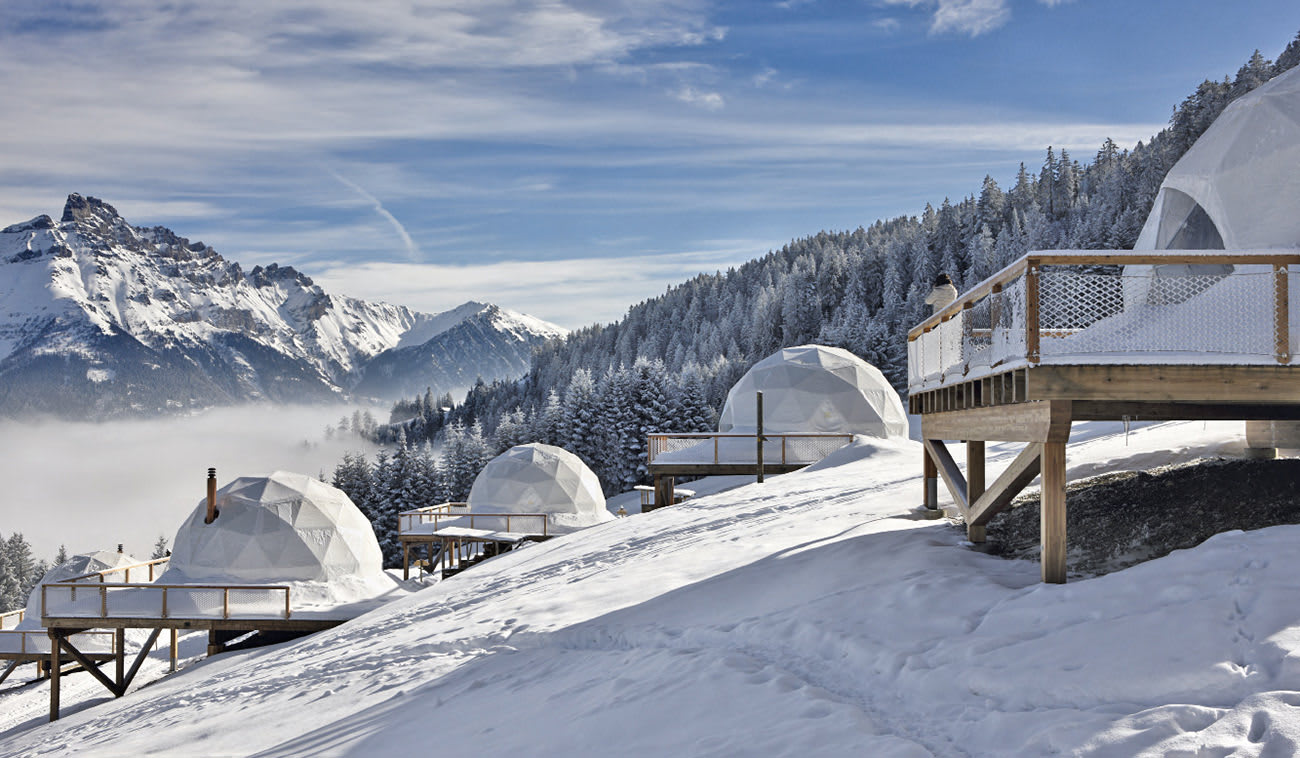Five Eco-Friendly Accommodation Brands Leading the Way in 2025
Eco-innovators are rewriting the rules of hospitality in 2025, and a few standout brands are setting the gold standard. From biodegradable room keys to zero-waste kitchens, these pioneers offer compelling case studies in sustainable hospitality at its finest. Here's a spotlight on five green lodging trailblazers showing others how it's done – and what travelers can expect from their stays in these eco-centric paradises.
Summary
In 2025, the hospitality industry is witnessing a remarkable shift towards sustainability, with several lodging brands leading the charge in eco-friendly innovations. These trailblazers are redefining luxury by integrating environmental responsibility into every aspect of their operations, from construction materials to daily practices. Travelers can now indulge in opulent experiences without compromising their commitment to the planet. Let's explore five green lodging brands that are setting the gold standard for sustainable hospitality this year.
Soneva Fushi: Pioneering Sustainable Luxury in the Maldives
Marine conservation and coral restoration
In 2023, Soneva Fushi unveiled AquaTerra, a state-of-the-art conservation, education, and science facility. This center serves as the hub for the Soneva Foundation Coral Restoration Program, which aims to rejuvenate local coral reef systems. Utilizing Mineral Accretion Technology (MAT), the program channels low-voltage electricity through submerged coral tables, accelerating coral growth. The facility also houses a spawning and rearing laboratory dedicated to developing heat-resistant super corals, a 3D-printing lab for producing coral substrates, and plans to install a micro-fragmenting laboratory capable of producing up to 100,000 corals annually.
Sustainable pest management
Addressing the challenge of mosquito control, Soneva Fushi transitioned from chemical fogging to an insecticide-free management system in 2019. This eco-friendly approach has led to a remarkable 95-98% reduction in the mosquito population, enhancing guest comfort and promoting biodiversity.
Carbon neutrality and environmental levy
Demonstrating its commitment to sustainability, Soneva Fushi has been 100% carbon neutral since 2012. This achievement is facilitated by a 2% environmental levy added to room rates, which offsets both direct and indirect CO2 emissions associated with each stay.
Waste-to-Wealth program and Soneva Namoona
The resort's Waste-to-Wealth program boasts a 90% solid waste recycling rate, with aspirations to reach 100% by 2030. Initiatives include transforming food waste into compost and repurposing materials like plastic and cans into art, contributing to a USD 3 million impact. In collaboration with local islands and the government, the Soneva Namoona initiative extends waste management efforts, emphasizing upcycling, recycling, and community education.
Educational initiatives and guest involvement
Soneva Fushi actively involves guests in its sustainability efforts through programs like the "Stay for Good" initiative. Guests can participate in activities such as assisting horticulturists in maintaining vegetable gardens, learning about permaculture methods, and contributing to waste management practices. In return, participants receive complimentary bonus nights, fostering a deeper connection to the resort's environmental mission.
Soneva Fushi exemplifies how luxury and sustainability can coexist harmoniously. Through innovative conservation programs, sustainable practices, and guest engagement, the resort continues to set a high standard for eco-friendly hospitality in the Maldives and beyond.
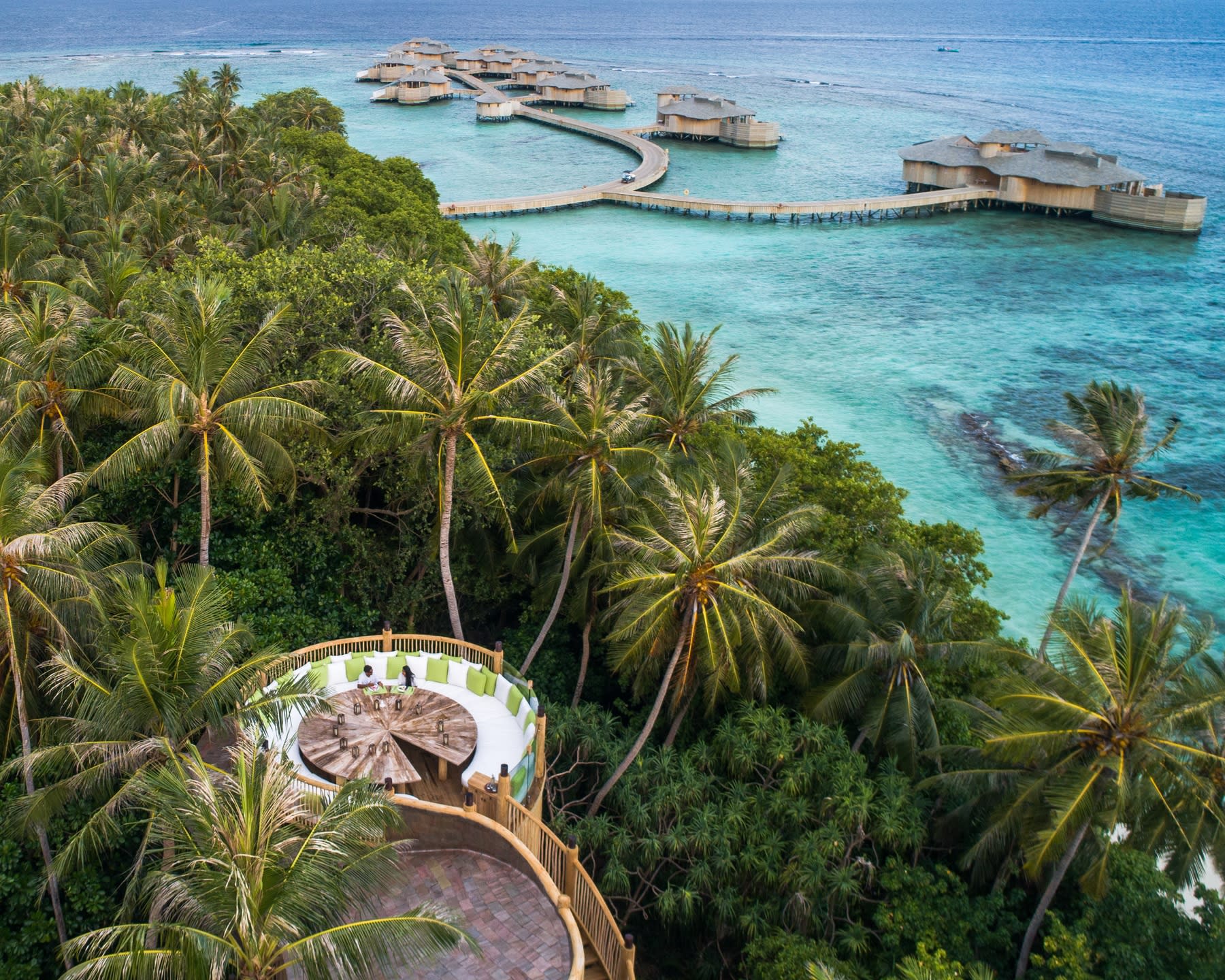
Six Senses Zighy Bay: Eco-Conscious Elegance in Oman
Zero Waste and Plastic Reduction
Embracing a zero-waste philosophy, the resort has implemented innovative measures to minimize its environmental footprint. Approximately 85% of waste is recycled or upcycled on-site. Glass bottles are transformed into ornaments and jewelry, while food waste is composted to nourish the organic garden. The resort has also significantly reduced single-use plastics, replacing items like straws and bottles with sustainable alternatives. Guests receive reusable shopping bags and water bottles upon arrival, encouraging participation in these eco-friendly initiatives.
Organic Farming and Sustainable Dining
The resort's commitment to sustainability extends to its culinary offerings. An on-site organic farm produces a variety of fruits, vegetables, and herbs, ensuring fresh, farm-to-table dining experiences. In 2022, the farm yielded over 3,000 kilograms of organic produce and more than 20,000 free-range eggs. Additionally, the resort's goats provide milk used to craft homemade cheeses. This closed-loop system not only enhances the dining experience but also supports the local ecosystem.
Marine Conservation Efforts
Six Senses Zighy Bay actively engages in marine conservation. The resort has initiated a coral restoration program, planting over 500 coral fragments to rejuvenate the house reef. Guests are invited to participate in this initiative and receive biannual updates on the growth of their planted corals. Collaborations with local authorities have led to the removal of ghost nets and other marine debris, significantly improving the health of the surrounding ocean.
Community Engagement and Education
Beyond environmental efforts, the resort is deeply involved in community development. Initiatives like "Sense of Oman: Through a Woman’s Eyes" empower local women by providing platforms to showcase traditional crafts and skills. Proceeds from these activities support the Dibba Women Association and local preschools. The resort also collaborates with local schools, offering workshops on sustainable farming and healthy eating, fostering a culture of environmental responsibility among the younger generation.
Guest Participation and Education
Guests at Six Senses Zighy Bay are encouraged to engage with the resort's sustainability initiatives. The Earth Lab offers workshops on eco-friendly practices, such as composting and upcycling. Activities like the "Hay Day" experience allow visitors to immerse themselves in traditional farming, including cheese-making and animal care. These interactive programs provide a deeper understanding of sustainable living and the resort's commitment to environmental stewardship.
Through these comprehensive efforts, Six Senses Zighy Bay exemplifies how luxury and sustainability can coexist, offering guests an eco-conscious retreat without compromising on comfort or elegance.
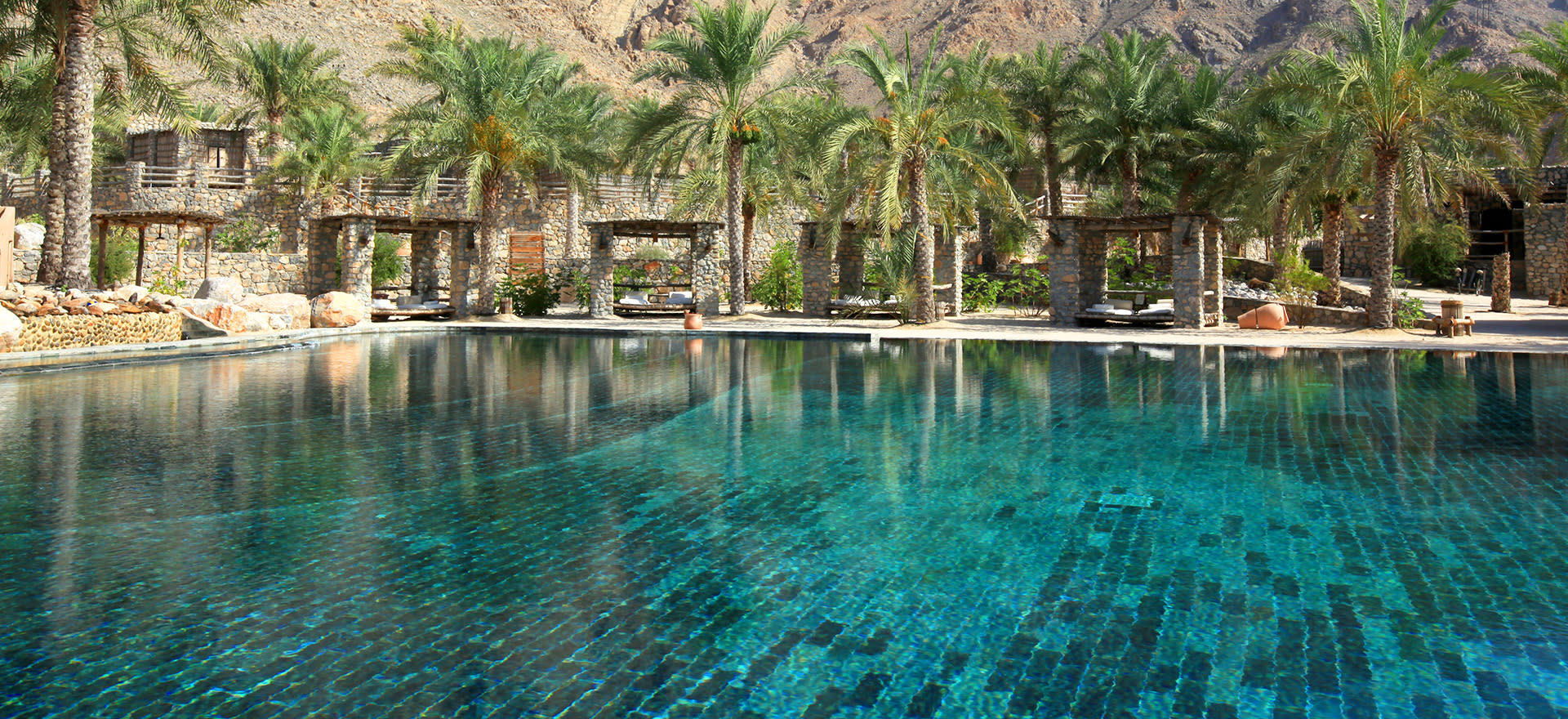
Hoshinoya Karuizawa: Japan's Zero-Emission Retreat
Harnessing Renewable Energy
A cornerstone of HOSHINOYA Karuizawa's sustainability efforts is its "Energy In My Yard" (EIMY) system. This initiative leverages the natural resources within the resort's vicinity to generate energy, significantly reducing reliance on fossil fuels. By utilizing hydroelectric power from the Yukawa River and geothermal energy from local hot springs, the resort achieves approximately 70% energy self-sufficiency. This innovative approach not only minimizes the environmental footprint but also ensures a seamless and comfortable experience for guests.
Zero-Emission Waste Management
In its commitment to achieving zero emissions, HOSHINOYA Karuizawa has implemented comprehensive waste management strategies. Since 1999, the resort has been dedicated to recycling and reusing waste to prevent incineration or landfill disposal. Food waste, for instance, is composted in collaboration with nearby farms, and the resulting compost is used to cultivate vegetables that are then served to guests. This closed-loop system exemplifies the resort's dedication to sustainable practices and community engagement.
Eco-Tourism and Nature Activities
Beyond its operational sustainability, HOSHINOYA Karuizawa offers guests immersive eco-tourism experiences. The resort's wildlife research center, Picchio, conducts nature tours that educate visitors about local flora and fauna. Popular activities include bird watching in the Karuizawa Wild Bird Sanctuary and evening excursions to observe flying squirrels, boasting a sighting rate of over 96%. These experiences foster a deeper connection between guests and the natural environment, promoting conservation awareness.
Celebrating a Legacy of Sustainability
In 2024, HOSHINOYA Karuizawa celebrated its 110th anniversary, marking over a century of commitment to environmental preservation and sustainable hospitality. Special events under the theme "Enjoy the forest, feel the forest" were held, highlighting the resort's rich history and ongoing dedication to coexisting with nature. These celebrations underscored the resort's role as a pioneer in integrating luxury with ecological responsibility.
HOSHINOYA Karuizawa exemplifies how luxury and sustainability can coexist, offering guests an unparalleled experience that honors and preserves the natural beauty of its surroundings.
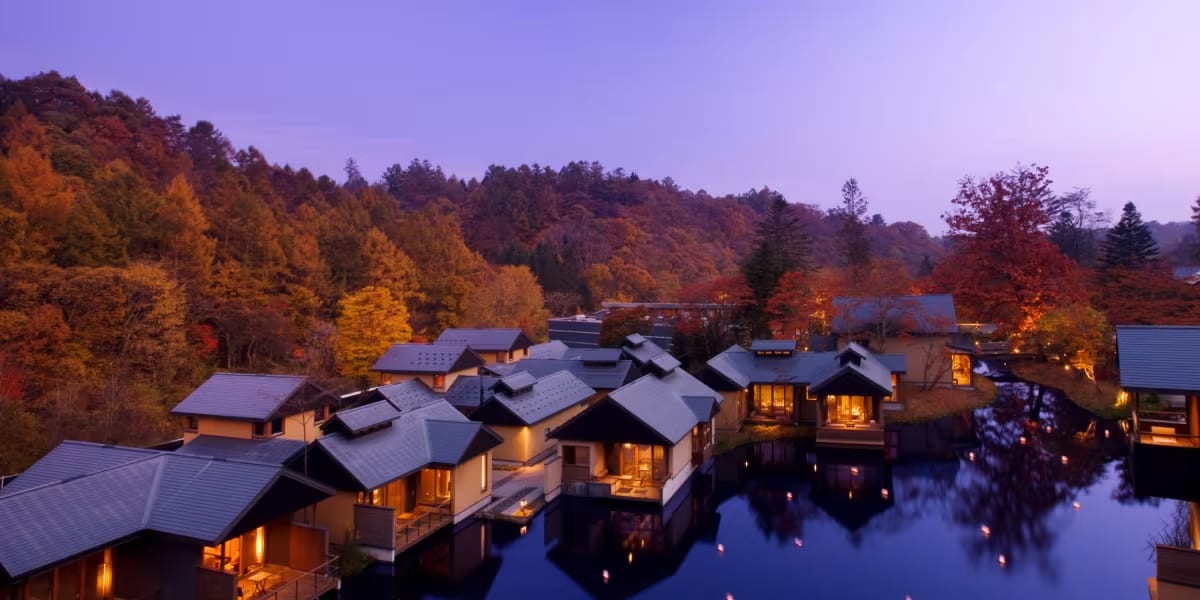
Populus Hotel: Denver's Carbon-Positive Urban Oasis
Its design, inspired by Colorado's native aspen trees, features a distinctive façade with eye-shaped windows that not only provide aesthetic appeal but also enhance energy efficiency by optimizing natural light and reducing heat gain.
Sustainable Construction and Materials
The hotel's commitment to sustainability is evident from its construction phase. Utilizing low-carbon concrete, Populus significantly reduced the carbon emissions associated with traditional building materials. Interior elements showcase reclaimed wood from Wyoming snow fencing and beetle-kill pine, while guest room carpets are crafted from recycled, biodegradable materials.
Innovative Environmental Initiatives
Populus has implemented several groundbreaking initiatives to minimize its environmental impact:
- One Night, One Tree Program: For every night a guest stays, the hotel plants a tree in partnership with the National Forest Foundation. To date, over 70,000 trees have been planted across 172 acres in Gunnison County, Colorado, aiding in reforestation efforts.
- Zero Food Waste: An on-site biodigester composts 100% of the hotel's food waste, converting it into nutrient-rich compost distributed to local farms, thereby supporting regional agriculture and reducing landfill contributions.
- Renewable Energy Commitment: The hotel operates entirely on renewable electricity, further diminishing its operational carbon footprint.
Eco-Friendly Guest Experience
Guests at Populus are immersed in an eco-conscious environment:
- Sustainable Dining: The hotel's restaurants, Pasque and Stellar Jay, source ingredients from regenerative, biodynamic, and organic farms, offering seasonal menus that highlight local produce and proteins.
- Green Amenities: Rooms are equipped with reusable water bottles, eliminating single-use plastics, and feature eco-friendly toiletries.
- Biophilic Design: The rooftop garden and surrounding streetscape are adorned with native trees and plants, enhancing biodiversity and providing a natural oasis in the urban setting.
A Model for Sustainable Hospitality
Populus Hotel exemplifies how luxury and sustainability can coexist, offering guests a comfortable stay while actively contributing to environmental conservation. Its comprehensive approach to reducing and offsetting carbon emissions serves as a pioneering model for future developments in the hospitality industry.
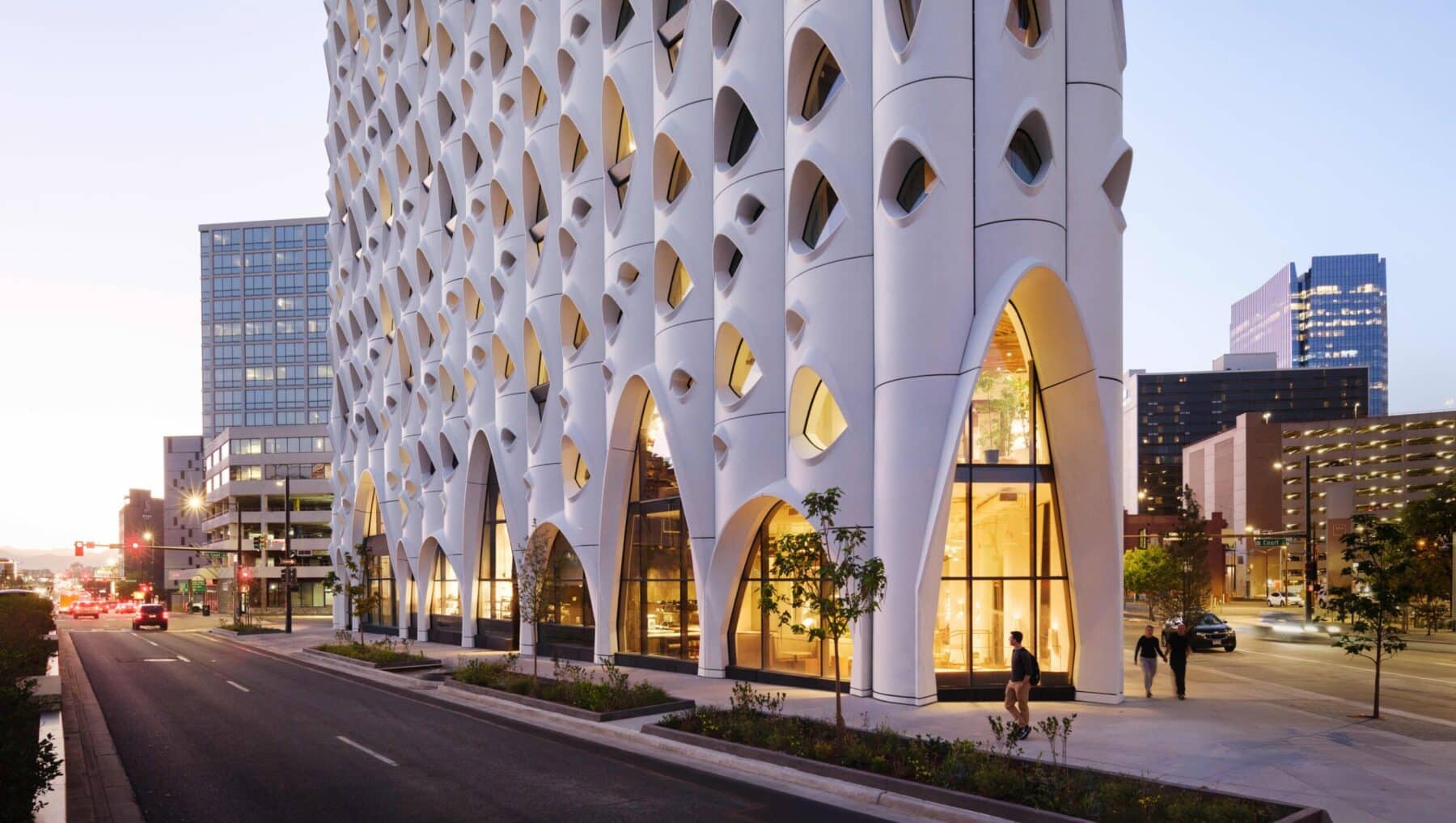
Whitepod Eco-Luxury Hotel: Alpine Sustainability in Switzerland
This unique resort features geodesic dome pods that provide guests with an immersive nature experience while adhering to sustainable practices.
Innovative Accommodation Design
The geodesic domes at Whitepod are engineered for energy efficiency, consuming about 30% less energy than traditional structures.
Their design promotes continuous airflow, reducing the need for artificial heating and cooling. Each pod is equipped with a wood-burning stove, utilizing locally sourced wood to minimize environmental impact.
Commitment to Sustainability
Whitepod's dedication to sustainability is evident in its operations:
- Renewable Energy: The resort sources 100% of its power from local hydropower plants, ensuring a clean energy supply.
- Water Conservation: Water-saving devices are installed on showerheads and faucets, and the resort utilizes nearby spring water to meet its needs.
- Waste Management: A comprehensive recycling program is in place, with organic waste composted and single-use plastics eliminated.
Engaging Guest Experiences
Guests at Whitepod can partake in a variety of activities that emphasize environmental appreciation:
- Seasonal Adaptation: In winter, the pods are covered with white canvas to blend with the snow, while in summer, green covers help them merge with the alpine meadows.
- Outdoor Activities: The resort offers hiking, skiing, and snowshoeing, encouraging guests to explore the natural beauty of the area.
- Culinary Delights: The on-site restaurant focuses on locally sourced, seasonal ingredients, supporting regional farmers and reducing the carbon footprint associated with food transportation.
Recent Developments
In recent years, Whitepod has expanded its accommodations to include energy self-sufficient timber chalets designed by Montalba Architects.
These prefabricated chalets are constructed using sustainable materials and are powered by a hydroelectric turbine, further enhancing the resort's commitment to eco-friendly practices.
A Model for Sustainable Tourism
Whitepod Eco-Luxury Hotel exemplifies how luxury and sustainability can coexist, offering guests a unique and responsible way to experience the Swiss Alps. Its innovative design and commitment to environmental stewardship set a benchmark for eco-friendly hospitality worldwide.
